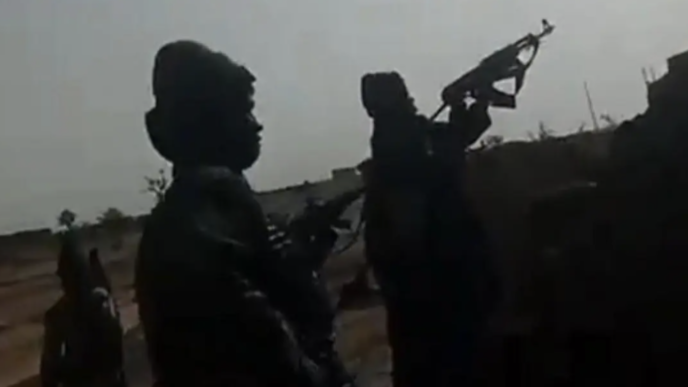With The Herd, Daniel Etim Effiong delivers one of Nollywood’s most unsettling and socially resonant crime thrillers in recent years—an unflinching reflection of a nation grappling with the terror, politics, and moral rot behind banditry. Premiering on Netflix this weekend, the film is as gripping as it is painful, threading personal tragedy with national trauma in a way that feels both cinematic and urgently real.
Set in Ekiti, The Herd pulls its tension from the contradictions of Nigerian society: communities terrorised by gangs who hide behind ethnic identities, government institutions stretched thin, and families forced into impossible decisions in the face of violence. Effiong does not merely tell a story; he indicts an entire system of chaos, corruption, and complicity.
The film begins with what should be a day of joy. Gosi (played by Daniel Etim Effiong, doubling as director and lead) attempts to bury his worries over his wife Adama’s recurring cancer scare to celebrate his friend Fola’s (Kunle Remi) wedding to Derin (Genoveva Umeh). But this joy collapses into a nightmare on the drive to the couple’s hotel.
The traffic jam caused by herders appears at first to be another frustrating Nigerian road incident—until the cattle rearers turn out to be a ruthless kidnapping syndicate. What follows is a cascade of dread: hostages dragged into the bush, a groom murdered on the way, and a grieving bride ordered to butcher her husband for the gang’s grotesque body-parts trade.
Advertisement
Genoveva Umeh delivers one of the film’s most haunting performances here—her disbelief, grief, and desperation are painfully believable. Gosi’s coerced compliance, his whispered promise to Derin that he is doing whatever is necessary to keep them alive, creates a moral tension that anchors the entire film.
Effiong’s storytelling works best in how it mirrors real Nigerian anxieties. Banditry here is not romanticised or given ideological excuses. The criminals include Hausa, Yoruba, and Igbo characters; a reminder that banditry is not an ethnic plague—it is a criminal economy.
The gang is religious only when convenient. We watch them perform Islamic prayers before burying their own, yet the same group murders innocents and trades in human body parts. The film smartly avoids the lazy stereotype of “killer herders,” instead exposing a complex network of crime rooted in greed, power, and impunity.
Advertisement
One of the film’s strongest threads is Adama’s (Linda Ejiofor-Suleiman) desperate mission to raise ransom money. Her hurdles—an uncooperative bank, a judgmental in-law family, and the revelation that her husband withdrew millions without informing his business partner—paint a portrait of a society where even in crisis, class, culture, and prejudice determine who deserves help.
The subplot involving Adama’s status as Osu in Igbo culture adds emotional weight. Her husband’s parents (played with intimidating elegance by Nobert Young and Tina Mba) agree to help only after forcing her to sign a humiliating undertaking to divorce their son afterwards. It’s a chilling reminder that cultural caste systems still shape the lives of many Nigerians—even at moments of extreme danger.
In a rare departure from Nollywood’s traditional portrayal of bumbling law enforcement, The Herd offers a more nuanced police investigation led by Adam Garba. The link to the criminals comes from an Apple Watch call placed by a relative of the groom abroad—a clever integration of modern tech into a very Nigerian scenario.
The discovery of body parts inside a freezer in a building next to a church, the involvement of a church official, and the subtle complicity of a respected priest (Lateef Adedimeji) underscores the film’s theme: evil often hides behind institutions that claim moral authority.
Advertisement
Even Mama Rainbow’s character—an elderly woman living near the gang’s hideout—turns out to be a spy for the criminals. Trust, the film insists, is a luxury no community can afford.
The gang’s internal politics are as deadly as their violence. When their godfather, Sheik, demands 80% of the ransom, the tension between criminal hierarchies explodes. His death, murdered by Anas—one of his own—marks a turning point in the film.
This betrayal is not just for shock value; it underscores the film’s thesis: banditry is an economy corrupted by greed, not an ethnic or religious crusade.
From the dirt-stained bridal gown to Gosi’s blood-blotted, torn shirt, the costume design is impressively detailed—visually capturing the degeneration from celebration to survival.
The casting is also deliberate. Actors from major Nigerian ethnic groups populate both victims and villains, a symbolic statement on national unity amidst shared tragedy.
Advertisement
Effiong gives a grounded performance—haunted, desperate, morally compromised. Umeh is magnetic. Blessing Jessica Obasi-Nze brings heart as the Youth Corps member who refuses to give up. Amal Umar’s Habiba, fluent in English and skilled in psychological manipulation, is a standout.
If The Herd stumbles anywhere, it is in the final act. While Gosi and the bride Derin are rescued in a tense police operation, viewers are left uncertain about the fate of the remaining hostages. This abruptness may frustrate audiences, though some may interpret it as a commentary on Nigeria itself—where tragedies often conclude without closure.
Advertisement
The Herd is a bold, harrowing, and necessary film.
It forces viewers to confront the messy reality of banditry—beyond political rhetoric, beyond ethnic scapegoating, beyond sensational headlines. Effiong’s use of suspense, realism, and moral complexity elevates the film into one of Nollywood’s strongest contemporary crime thrillers.
Advertisement
Views expressed by contributors are strictly personal and not of TheCable.




